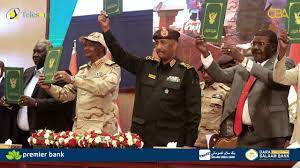

The Head of the Sudanese Congress Party and a key member of the civilian coalition ‘Tagadum,’ Omer al-Digair, has declared their willingness to engage in discussions with Lt Gen Abdel Fattah al-Burhan, Chairman of the Sovereign Council and Commander-in-Chief of the Sudanese Army. The talks aim to explore the potential for a ceasefire and an inclusive national dialogue.
This announcement follows al-Burhan’s rejection of the Addis Ababa Declaration signed between Tagadum and the Rapid Support Forces (RSF). Despite this, al-Burhan expressed openness to meeting political and civil society leaders in Port Sudan.
Al-Digair emphasized the urgency of the meeting, stating, “We are ready to meet him [al-Burhan] in pursuit of achieving the nation’s interest, which begins with a ceasefire and ending the suffering of displacement, violations, and destruction.”
Highlighting the need for restraint and de-escalation, al-Digair stressed the importance of achieving lasting peace.
He outlined a post-ceasefire focus on creating a conducive environment for a political process addressing the root causes of the crisis, aiming for sustainable peace, democratic transformation, and economic development.
While awaiting an official response from al-Burhan, the Tagadum leadership clarified that the Addis Ababa Declaration is not a binding agreement but a starting point for engaging with various parties to find a comprehensive solution.
Al-Digair underscored the collaborative effort required from all Sudanese stakeholders committed to peace and democratic transformation.
He revealed that Tagadum has reached out to major political parties and armed groups, seeking a unified approach to resolving the conflict.
The Addis Ababa Declaration, signed by Abdallah Hamdok and Mohamed Hamdan Hemetti, commits paramilitary forces to an immediate ceasefire, negotiation with the army, facilitating displaced people’s return, opening humanitarian corridors, releasing prisoners of war, and cooperating with investigations into violations.
more recommended stories
 Somaliland’s Berbera Industrial Park: A New Era of Investment and Job Creation
Somaliland’s Berbera Industrial Park: A New Era of Investment and Job CreationThe Government of Somaliland, under the.
 President Irro’s Landmark Visit to UAE: A Diplomatic and Economic Win for Somaliland. Dubai, UAE – Somaliland’s Diplomatic Breakthrough
President Irro’s Landmark Visit to UAE: A Diplomatic and Economic Win for Somaliland. Dubai, UAE – Somaliland’s Diplomatic BreakthroughBy: Abdi Jama President Dr. Abdirahman.
 Kenya’s Unjustifiable Interference in Sudan: A Grave Violation of International Law and Regional Stability
Kenya’s Unjustifiable Interference in Sudan: A Grave Violation of International Law and Regional StabilityBy: Abdi Jama Kenya’s continued meddling.
 𝗙𝗼𝗿𝗺𝗲𝗿 𝗣𝗿𝗲𝘀𝗶𝗱𝗲𝗻𝘁 𝗠𝘂𝘀𝗲 𝗕𝗶𝗵𝗶’𝘀 𝗥𝗲𝗰𝗸𝗹𝗲𝘀𝘀 𝗔𝗰𝘁𝗶𝗼𝗻𝘀 𝗠𝘂𝘀𝘁 𝗡𝗼𝘁 𝗕𝗲 𝗜𝗴𝗻𝗼𝗿𝗲𝗱 – Abdihalim Musa
𝗙𝗼𝗿𝗺𝗲𝗿 𝗣𝗿𝗲𝘀𝗶𝗱𝗲𝗻𝘁 𝗠𝘂𝘀𝗲 𝗕𝗶𝗵𝗶’𝘀 𝗥𝗲𝗰𝗸𝗹𝗲𝘀𝘀 𝗔𝗰𝘁𝗶𝗼𝗻𝘀 𝗠𝘂𝘀𝘁 𝗡𝗼𝘁 𝗕𝗲 𝗜𝗴𝗻𝗼𝗿𝗲𝗱 – Abdihalim MusaYesterday, Somaliland witnessed a deeply troubling.

